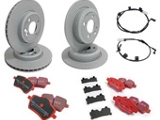MINI brakes are an essential safety feature of your vehicle. They work by converting kinetic energy into heat through friction, allowing your car to come to a stop when you press the brake pedal. In this guide, we will cover everything you need to know about MINI Cooper brakes, including their components, maintenance, and replacement.
What Should You Know About MINI Cooper Brakes Before Purchasing Them?
Like all the different MINI models, the brakes for various models also differs. For example, the R53 model (Generation 1) MINI front brakes use a single-piston sliding caliper system with a 48mm diameter piston acting on 276mm vented discs1. The braking system was fitted from a One through to a Cooper S between the vehicle’s inception and September 2006 when the R56 model (Generation 2) was introduced. So make sure you have the right brake for your car by selecting your car type, model and make before you buy.
Ready to Shop for MINI Cooper Brake Parts? ![]()
Components of MINI Cooper Brakes
To understand how MINI brakes work, it is important to know their components. Here are the main parts of your MINI braking system:
- MINI Cooper Brake Pads: These are the parts that make contact with your brake rotors and create friction, causing your car to slow down or stop. Brake pads come in different materials, including organic, semi-metallic, and ceramic, and each has its own benefits and drawbacks.
- MINI Cooper Brake Rotors: These are the discs that spin with your wheels and are clamped down by your brake pads, causing your car to slow down or stop. Brake rotors come in different types, including solid, vented, and drilled, and each has its own advantages and disadvantages.
- MINI Cooper Brake Calipers: These are the parts that hold your brake pads in place and squeeze them against your brake rotors when you press the brake pedal. Brake calipers can be fixed or floating, and each has its own benefits and drawbacks.
- MINI Cooper Brake Lines: These are the tubes that carry brake fluid from your master cylinder to your brake calipers, allowing your brakes to function. Brake lines can be made of steel or rubber, and each has its own pros and cons.
MINI Cooper Brake Maintenance
Proper brake maintenance is crucial for the safety and performance of your MINI. Here are some tips to keep your brakes in top condition:
- Check your MINI brake pads regularly: Look for signs of wear or damage, such as uneven wear, noise, or vibration. Replace your brake pads when they are worn down to a thickness of 3mm or less.
- Inspect the brake rotors on your MINI: Look for signs of warping or damage, such as cracks or grooves. Replace your brake rotors if they are worn down to the minimum thickness or if they are damaged.
- Change your MINI Cooper brake fluid: Brake fluid absorbs moisture over time, which can lead to corrosion and decreased brake performance. Replace your brake fluid every 2-3 years or as recommended by your MINI Cooper owner's manual.
- Bleed your MINI brakes: Bleeding your brakes removes air from your brake lines and ensures proper brake function. Bleed your brakes every time you replace your brake pads or if you notice a spongy brake pedal.
MINI Cooper Brake Replacement
Even with proper maintenance, your MINI brakes will eventually wear down and require replacement. Here are some signs that it's time to replace your brakes:
- Squeaking or Grinding Noise: If your MINI is emitting a squeaking or grinding noise when you apply your brakes, it's a sign that your brake pads are worn down and need to be replaced.
- Vibration or Shaking: If you feel a vibration or shaking in your steering wheel or brake pedal when you apply your brakes, it's a sign that your brake rotors are warped and need to be replaced.
- Soft Brake Pedal: If your brake pedal feels soft or spongy, it's a sign that you have air in your brake lines or that your brake pads are worn down and need to be replaced.
When replacing your MINI Cooper brakes, it's important to use high-quality parts that are designed specifically for your vehicle. Here at MiniMania you'll find OEM (original equipment manufacturer) parts and aftermarket brake parts for your MINI.









